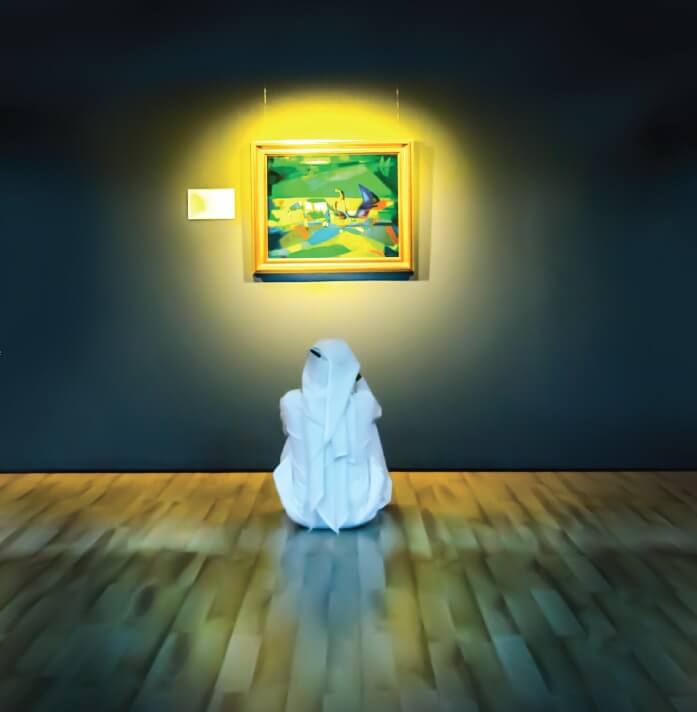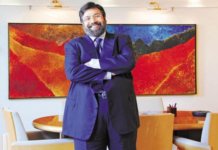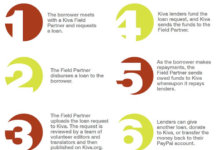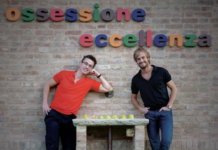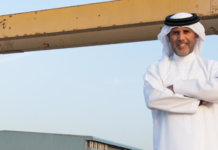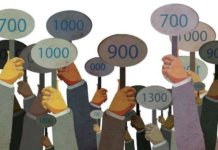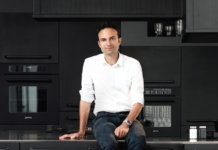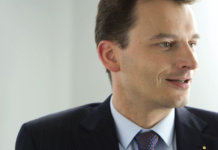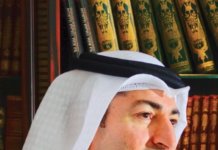An Interview with Sultan Sooud Al Qassemi, Founder of Barjeel Art Foundation
With a quarter of a million Twitter followers and dozens of political articles published on notable news sites such as the Huffington Post, Sultan Sooud Al Qassemi may well have established himself as one of the most resonating voices on current affairs in the Arab world. Rising to fame through his coverage of political unrest in the Middle East, Al Qassemi is increasingly representing the region by way of an ever widening platform and his audience thankfully follows his insightful analysis of current affairs. Due to his constant exposure to the public eye, many may believe that they know who Sultan Sooud Al Qassemi is and what he stands for. But how much does a 140-character tweet reveal about a person? To understand what motivates this young Emirati to reach out to the world in the way he does, it is advisable to take a closer look at his great passion for the arts.
After over a decade of involvement in the arts whilst building a collection of over 600 pieces, Sultan Sooud Al Qassemi’s efforts to further the art community in the UAE has culminated in the establishment of the Barjeel Art Foundation in the Maraya Art Centre in Sharjah. The Foundation serves as a continuous display space for his considerable private collection. In a conversation with Tharawat magazine, Sultan Sooud Al Qassemi reveals how his collection is a sincere testimony to his own tastes and opinions, in which ways he wishes to engage with the arts community, and why the Gulf has grown into the cultural centre of the Arab world.
[ms-protect-content id=”4069, 4129″]
Art as an expression…
Sultan Sooud Al Qassemi sits opposite us in an antechamber of the Barjeel Art Gallery in Al Qasba, Sharjah. Surrounded by the beautiful art pieces on display we want to know first what prompted Al Qassemi to share his private collection with the world. “The Barjeel Art Foundation is an extension of my output,” he says enthusiastically. “It is my attempt to communicate with the world not just through my writing, but also visually. When people read my articles, they always ask me about my perspective on social issues and politics. I feel that a picture is worth a thousand words, and being able to build a collection and share it with the rest of the world, whether it’s by exhibitions in the UAE or through loaning them internationally, has enabled me to reach a wider audience.” Al Qassemi’s vision is based on philanthropy as he aims to influence people’s lives in a positive way through the display of his vast art collection.
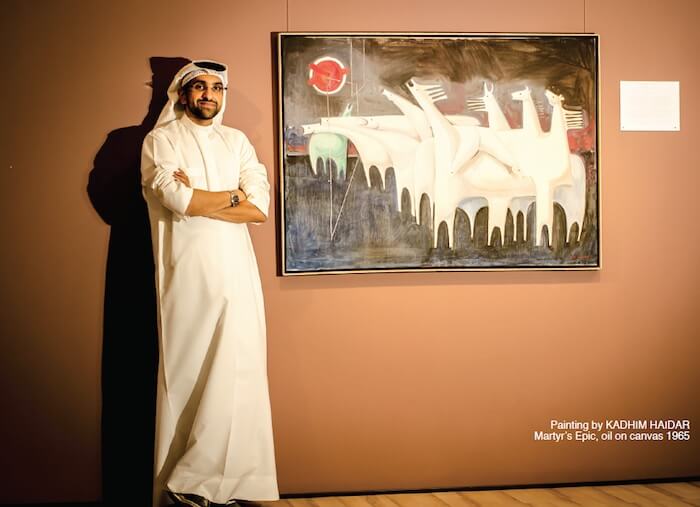
“The art I collect is a message from me to the world via the artists,” continues Sultan Sooud Al Qassemi. “When we show our artworks in various countries all over the world, the visitors gain a different perspective on the Arab world. They see contemporary conflicts and issues as visualised by Arab artists, and it changes their perspective on what is happening in the region. In art, there’s no language barrier. You just present an artwork about the Arab revolutions or the Arab uprisings or other issues that are defining the region and you touch a nerve.” To Al Qassemi, art and politics intersect in many different ways. Examining the Barjeel gallery, it is made clear that he does not shy away from underlining his beliefs when acquiring artwork.
It’s personal…
“Normally, the artworks reflect my personal taste and politics,” confesses Sultan Sooud Al Qassemi, folding his arms across his chest and leaning back in his chair. “Sometimes, I collect artworks that send a message I don’t necessarily agree with, but it is important at that moment in time to highlight that particular angle on a current issue. If you compare me with other collectors in the Arab world, you’ll find that I try and avoid national bias. In the Barjeel collection, we span the width and breadth of the Arab world, from Morocco to the Gulf. You find artists from almost every single country in the Arab world represented here. Artworks from the 50s as well as more recent pieces.”
Al Qassemi’s collection is not neutral but rather purposefully provocative. “I have artworks that I cannot even exhibit in the Gulf,” he says with an air of satisfaction. “I try to push the envelope further – not just in the arts world, but in the social commentary world as well. Many artists changed their opinions about their governments because of the Arab uprisings. Art is a political narrative, a political history that is constantly changing. Sometimes I am in a dilemma because I do not agree with the artist’s politics but I love the artwork. Does that take away anything from the artwork itself? I don’t think so.” When we ask why he would take the risk of exposing himself to potential criticism from the public, Sultan offers a simple rebuttal. “Life presented me with this opportunity to express myself. I really believe in engaging communities, whether it was here in the Gulf or throughout the world. That’s why I write in English, and that’s why I try and present my activities and views to students. I try to inspire as many people as I can. I feel that this is just another aspect of my personality.”

The family angle…
In addition to his many artistic endeavours, Sultan Sooud Al Qassemi is also an executive in his family business. His family has proven incredibly supportive in Al Qassemi’s extracurricular art pursuits. “My family members either attend our openings at Barjeel or visit at a later date. One of my nieces became an artist, and another one is a passionate hobby artist, and I have definitely had a hand in that,” he smiles. “Generally, we live in an artistic environment. The ruler of Sharjah himself is a huge art collector and a patron of the arts. I grew up around family members and friends who are interested in the arts. We have an affinity with each other because we are trying to build an industry. And the industry will not thrive with one single person – it has to thrive as a community.” Similar to his writing and social media following, Al Qassemi is not driven by attaining any personal glory through exhibiting his art but rather sees himself as an extension of a larger movement.
Shaping forces in the Middle Eastern art scene…
Sultan Sooud Al Qassemi is recognised internationally as a patron and expert of Middle Eastern art. “I think the emergence of the Gulf art scene is one of the biggest trends that I’ve seen over the past decade. Artists in the Gulf have been more and more recognised over the past decade. There are also many Middle Eastern artists who have chosen to move to the Gulf, especially to the UAE. This is something that did not exist in the 1970s, 80s and 90s. Moreover, the auction houses that came to the Gulf helped establish an art evaluation process that we didn’t have before.” Al Qassemi is particularly outspoken when detailing his country’s achievements, visibly beaming with pride. “We had one or two galleries in the 80s and now we have several dozen just in Dubai. In addition, art fairs and the new museums help the industry along. All of these developments are transforming the Gulf into the cultural centre of the Arab world.”
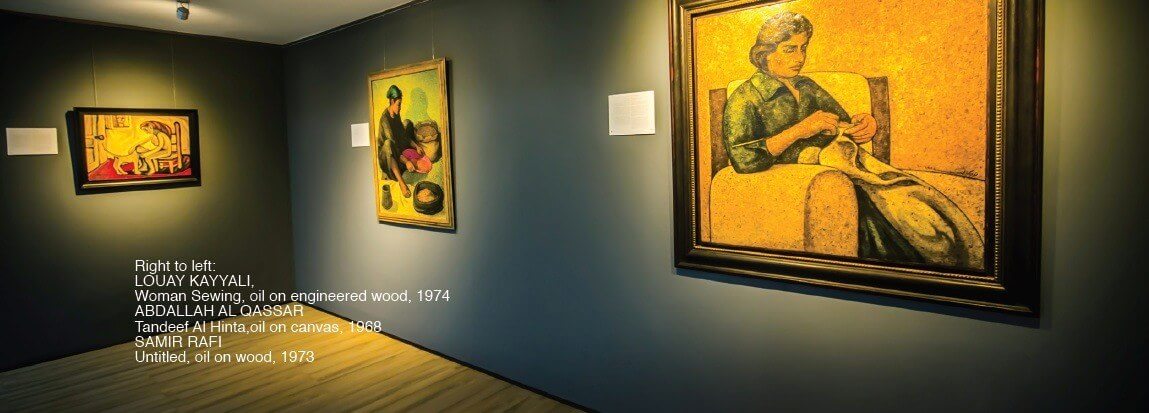
The ins and outs of collecting…
With a globally respected art knowhow, Al Qassemi is able to impart wisdom related to the ups and downs of the market as few in the region can. “The arts scene is a constantly shifting environment. I mean there are artists who defined the 80s and 90s but today nobody has heard of them. Some Arab artists, sold pieces a few years ago for several hundred thousand dollars, and today their works are only worth half that price. On the other hand, there are numerous fantastic artists and many of the established collectors don’t even know them.” When walking through the Barjeel collection it is fairly apparent that Al Qassemi has sought to find a balance between acquiring works by established artists and supporting emerging new talent from all over the Arab world.
By possessing an ethical outlook on collecting art, does Sultan Al Qassemi’s evenness allow for thoughts of art collecting as a business investment? “I don’t think one should merely view art as an investment. But, to negate the existence of that aspect, to ignore the fact that art has to be worth something is not right either,” he explains. “If you buy an artwork without studying its worth, without attaching a fair value to it, you damage the art industry. If a young artist is selling his or her artworks for an exorbitantly high price, then that artist does not appreciate that he or she has to leave room for growth,” adds Al Qassemi animatedly. “The artist is not thinking of a long-term relationship between himself, the collector and the galleries. I think it is essential that there is a fair valuation process attached to an artwork. For instance, there are a couple of artists whose works were sold for charity. Artists draw a national symbol and collectors get very sentimental and buy it at a high price. In reality the artwork might only be worth a fraction of the bid. By engaging in this sort of behaviour, buyers are also doing the artist a disservice.”
Collectors in the UAE face a legal environment that has only just begun to develop in their favour, explains Al Qassemi. Many art galleries and foundations suffer from legislative challenges and a lack of regulation adaptive to the requirements of collectors. “I still have a commercial licence. I can’t even apply for grants even though nothing is sold from the Barjeel collection,” Al Qassemi confirms.
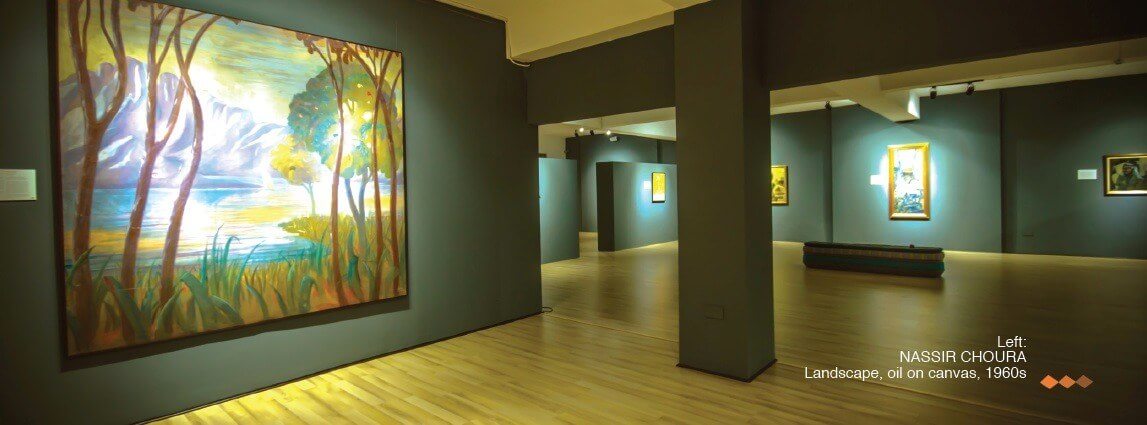
Not for sale…
The Barjeel gallery serves as a window into Al Qassemi’s extensive collection but none of the carefully selected pieces are for sale. We ask Sultan whether he ever parts with any of his pieces: “Yes, I’ve sold artworks that are not by Arab artists. I had some pieces by European artists, but they don’t fit into the collection of Barjeel.” Of course tastes change over time, Al Qassemi goes on to emphasise, and this is reflected in his current collection.
”You have to adapt. Sometimes you realise that you have a huge hole in your collection that you need to plug, and that’s where you grow; you understand what is important and your tastes change.” This dynamism is well depicted in the Barjeel collection and in many ways describes Al Qassemi’s character. It becomes clearer when he draws parallels to real life. “This process is similar to what happens to the people in your life: Over time you distance yourself from people sometimes inadvertently, but this is how life is. You move cities or even countries. You see less and less of people. You have to be dynamic. And collecting art is just like life in that way. You have to adapt.”
In spite of a personal philosophy geared towards change, Al Qassemi is nonetheless attached to some pieces in his collection and is certain that he will never part with them. He smiles wistfully and explains, “There are about ten pieces that I see that I will never ever sell or give away. I have chased these artworks around the world. When you have put that much research, that much effort into getting an artwork it becomes part of your soul, of who you are. I appreciate the value and the historic background of all artworks in my collection but there are some artworks that just touch my personality in ways that other artworks can’t.”
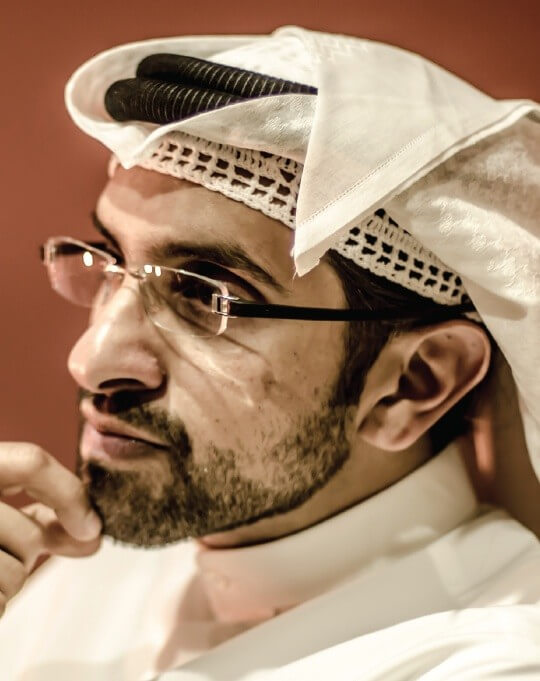
Would you do it again?
Sultan Sooud Al Qassemi started collecting over a decade ago. 600 art pieces later, we want to know if he has any regrets. “If I could do it all over again, I would have concentrated only on Arab art from the very beginning, rather than diversifying geographically,” Al Qassemi states without hesitation. “But I wouldn’t say that this would alter the collection significantly. It would have maybe enriched it a bit more, had I been more aware of where I wanted to go by 2008 and 2009.”
Moreover, his ambition to impact his immediate surroundings has not yet been fulfilled. “I haven’t engaged with the community as much as I would like to. I would ideally have a permanent collection space, a contemporary collection space, and a temporary collection space. I would ideally have a structured grant. I would ideally like to have a foundation licence, so I can then have an advisory council. I feel like it would open up so many possibilities for Barjeel. I’m very proud of having sent artworks across the world, but I feel like there’s so much more to do because of the responsibility that I feel I have now. And the recognition that I have compels me to work even harder.”
Get involved…
As is his way with any topic close to his heart, Sultan Sooud Al Qassemi is outspoken when it comes to giving recommendations on how to support the arts: “When you build your offices and your homes, try and incorporate your local art industry rather than buying prints. You can spend a little more money and buy an original artwork. You would be supporting an industry that’s valuable. You would be making your office space and your homes a unique space. You would be supporting young entrepreneurs who are trying to start a new career.”
To the business community keen on viewing art solely as an investment, Al Qassemi recommends doing so locally, a practice he believes will in turn enrich society and the region at large. “Rather than trying to buy artworks that are very valuable, but reflect another culture and another community, try and look into the regional artists,” Al Qassemi emphasises. “Try and build something that is unique to you and unique to your own country and your own culture.” Leaving the Barjeel gallery and taking a last glimpse at his outstanding collection makes Al Qassemi’s final thought ring even louder in our ears. Al Qassemi has fulfilled his artistic ambition and made the art industry, his country, and the Arab world at large very proud indeed.
Tharawat Magazine, Issue 20, 2013
[/ms-protect-content]



